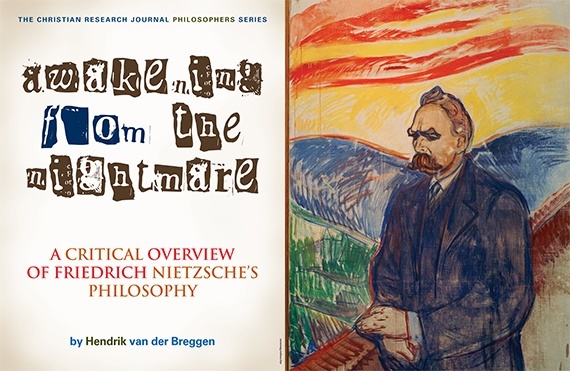This article first appeared in Christian Research Journal, volume 34, number 01 (2011). he full text of this article in PDF format can be obtained by clicking here. For further information or to subscribe to the Christian Research Journal go to: https://www.equip.org/product/crj-subscription/
The anti-God, anti-truth, and anti-democratic philosophy of Friedrich Nietzsche (1844–1900) is currently very influential and in need of critical examination. In this article, I set out some salient features of Nietzsche’s philosophy—God is dead, perspectivism versus truth, slave-master morality, will to power, the superman—and argue that his philosophy is deeply problematic. Indeed, Nietzsche’s startling moral views should waken critical thinkers from philosophical slumber.
There are three major criticisms of Nietzsche’s philosophy. First, Nietzsche’s slave-master morality has the makings of a moral nightmare because the will to power of the so-called superman/superior person is allowed to trample over others if the superman so desires; but we know such a moral view is false. Second, Nietzsche’s claims (1) that there is no truth and (2) that all knowledge is a matter of perspective (interpretation) are both self-refuting. The latter claim, moreover, also involves a debilitating infinite regress. Third, contrary to what Nietzsche would have us think, there are good reasons for thinking that God is not dead.
Friedrich Nietzsche (1844–1900) is famous for the claim “God is dead” and for looking unblinkingly at the philosophical implications of God’s alleged passing. According to contemporary philosopher Simon Blackburn, Nietzsche is “currently the most influential of the great philosophers.”1 Indeed, Blackburn adds, Nietzsche is “the patron saint of postmodernism.”2
Unfortunately (for those seeking philosophical clarity), Nietzsche’s writings are sometimes aphoristic, poetic, nonsystematic, intentionally abstruse, even downright contradictory, making Nietzsche’s work notoriously difficult to interpret. Consequently, there are, according to Nietzsche specialist Robert Wicks, “very wide differences in interpretation among scholars.”3 Nevertheless, the salient features of Nietzsche’s philosophy can be outlined with reasonable accuracy.
In this article I sketch some of these features—God is dead, perspectivism versus truth, slave-master morality, will to power, the superman—and argue that Nietzsche’s philosophy is deeply problematic. Contrary to what Nietzsche would have us think, there are good reasons for thinking that God is not dead, that perspectivism does not preclude our knowledge of truth, and that slave-master morality (wherein the will to power of the so-called superman/superior person dominates) has the makings of a moral nightmare—a nightmare that should waken critical thinkers from philosophical slumber.
PUTTING GOD, TRUTH, AND MORALS TO SLEEP
Nietzsche claims that “God is dead.”4 Nietzsche adds, provocatively, “And we have killed him.”5 The idea is that God—the Christian God—doesn’t exist, and people have made God irrelevant to their lives. Moreover, according to Nietzsche, believing in God is not healthy: God is other worldly and thus distracts people from life in the real world, and, because God condemns people for expressing their animal urges, God is anti-life. (Nietzsche identifies three main animal urges that God curtails: “sensuality” [i.e., sex], “lust to rule,” and “selfishness.”6)
Nietzsche is very clear about Christianity: “In Christianity, neither morality nor religion comes in touch at all with reality.”7 Moreover, Nietzsche purports to put us in touch with reality:
Nature is chance.8
The astral order in which we live is an exception….The total character of the world…is in all eternity chaos—in the sense not of a lack of necessity but of a lack of order, arrangement, form, beauty, wisdom, and whatever other names there are for our aesthetic anthropomorphisms.9
Those iron hands of necessity which shake the dice-box of chance play their game for an infinite length of time: so that there have to be throws which exactly resemble purposiveness and rationality of every degree.10
Also, the gospel reports of Jesus’ miraculous resurrection are to be dismissed as “saintly legends” and “clumsy fable.”11
Therefore, God does not exist. The world may seem designed, but, because of an eternity of undirected reconfigurations of matter, the appearance of design came about by chance. The universe is actually atheistic and in flux—an ultimately meaningless flux.12
Nevertheless, Nietzsche affirms life. Indeed, according to Nietzsche, onto the flux that is the world, the human mind constructs order—invents interpretations—to serve the life interests and values of the individual.13 Moreover, there are “only interpretations,” no facts.14 And these interpretations are not for truth’s sake, but for survival and health.15 In other words, our interpretations—our perspectives (interpretive judgments concerning facts and values grounded in our background assumptions, conceptual schemes, languages)—do not correspond to reality; they are merely useful.16
Appropriately, Nietzsche addresses the concept of truth: “What then is truth? A movable host of metaphors, metonymies, and anthropomorphisms….Truths are illusions which we have forgotten are illusions.”17 Nietzsche adds: “Truth is the kind of error without which a certain species of life could not live.”18 Moreover, Nietzsche writes: “There are many kinds of eyes. Even the sphinx has eyes—and consequently there are many kinds of ‘truths,’ and consequently there is no truth.”19
Because different people have different styles of survival and health, which arise from their various subjective aesthetic values/tastes (i.e., “energies…impulses…and above all…the ideals and phantasms of [the] soul”20), the result is a plurality of perspectives, but no truth. Whatever interpretation serves one’s aesthetic interests in the project of affirming and enhancing one’s life is the way to go.21
and the Superman
Nietzsche’s slave-master moral vision also centers on the affirmation of life—at least the life of some. Yes, Nietzsche acknowledges, life is full of suffering and ultimately purposeless, but there is a joyful thrill to life, too. So Nietzsche invites us to live in such a way that satisfies our individual “will to power” and to do so with style, in accordance with our own personal aesthetic taste. But only the “masters”—that is, those whose will to power is strong—need apply.
Broadly, the will to power is a mechanism or principle that governs the universe in such a way that the various centers of power in the universe (whether organic or inorganic) strive to expand the scope of their dominion over other such centers.22 More narrowly, but pertinent here, the will to power identifies the human individual’s sole motivation for any act (including apparently altruistic acts as well as the act of interpreting the world): that is, self-centered desire for increased power and domain.23
Masters are those individuals who exercise their will to power successfully, in order to satisfy their values and interests. Nietzsche describes these individuals as strong, noble, proud, bold, self-disciplined, ambitious, unconcerned with convention, creative, artistic, instinctual, sensual, healthy, and free.24 Masters are superior to the rest of the human herd.25 For Nietzsche, exemplars of masters are often seen in the likes of the poet Johann Wolfgang von Goethe (1749–1832).26 Conquerors such as Napoleon Bonaparte are also highly regarded by Nietzsche (though not as highly as Goethe).27 Freedom, for Nietzsche, involves “being prepared to sacrifice people to one’s cause—oneself included. Freedom means that the manly instincts which delight in war and victory rule over other instincts.”28
Enter master morality.29 Nietzsche thinks that, because God is dead, absolute ethics are dead, too, so those of us who are strong should dare to go “beyond good and evil,” that is, transcend traditional values—especially the false belief in the moral equality of humans—and invent our own values. In other words, the strong are invited to go beyond the herd, and, depending on one’s instincts or sense of style, perhaps even do so at the expense of the herd. Such an individual is an evolutionary step beyond the ordinary human: he is the Übermensch, or “Overman.” He is Superman.
Slave morality, on the other hand, is the morality of the weak. The herd or rabble resents the strong because the strong thwart the will to power of the weak. So, to seek revenge, the weak promote the virtues of humility and friendliness, plus the ideals of human equality and democracy. These alleged virtues and supposed ideals are useful tools for controlling the strong; they aren’t true in any deep sense, though the weak would like to foist the illusion of their truth onto the strong.
Nietzsche’s Moral Nightmare
Surely, the readily apparent problems with Nietzsche’s moral vision should startle critical thinkers and spur them to be critically alert to Nietzsche’s philosophy. (We will, then, assess Nietzsche’s views in reverse order of exposition.)
Simon Blackburn cuts to the chase: “[Nietzsche] frequently presents the creative artist rather than the warlord as his best exemplar of the [Übermensch] type, but the disquieting fact remains that he seems to leave himself no words to condemn any uncaged beasts of prey who best find their style by exerting repulsive power over others.”30
Philosopher Leszek Kolakowski puts the matter more provocatively via rhetorical question: “Nietzsche tells us to exercise the will to power and create the meaning of life for ourselves, regardless of traditional moral laws and inherited ideas of good and evil. How, on this view, does a great artist differ in his greatness from a great criminal? Are we to admire both equally, since both created the meaning they wanted in their lives?”31
In other words, the strong individual who flourishes by treating his criminal activities (rape, torture, murder, for example) as great art is justified in Nietzsche’s philosophy. Why? Because the aesthetic appeal of such activities is a mere matter of taste, a style of survival and flourishing, which is acceptable, as long as life—especially one’s own life, if one is strong—is affirmed.
An apt fictional illustration of the grisly style of life allowed and even ethically elevated on Nietzsche’s moral vision is The Joker, as portrayed by Heath Ledger in the Batman film The Dark Knight.32 The Joker’s heinous multiple murders strike us (rightly) as maniacal. However, on Nietzsche’s philosophy all we can say is—hey—it’s The Joker’s life, his will to power, and he’s exercising it freely, with a style that allows him to flourish according to his own aesthetic judgment and aesthetic taste. Nietzsche and his more tame students may not like such “art,” but the philosophical school bus Nietzsche has started doesn’t stop rolling just because some less daring, more conventional Übermenschen want to get off.
On Nietzsche’s moral vision, therefore, the strong man invents/constructs morality on the basis of his subjective will, so, ultimately, might makes right. Clearly, however, this subjective moral vision leads to all sorts of obvious moral repugnancies, as the history of such nonfictional “jokers” as megalomaniac tyrants and serial killers has demonstrated.33
To affirm life, master one’s passions, and develop one’s strengths—these are admirable ends for which Nietzsche should be commended. To permit the achievement of these ends at the expense of other people, however, is clearly despicable and evil. We know that people—all people—have equal intrinsic moral worth, so we are within our epistemic rights to be skeptical of any philosophical story that tries to cast doubt on this.34
Stupor about Truth
We should also be skeptical of Nietzsche’s denial of truth and Nietzsche’s perspectivism. Nietzsche’s denial of truth self-refutes, directly and indirectly. When Nietzsche says truth is mere metaphor or illusion, then his claim, which purports to be true, is mere metaphor or illusion—in other words, not true. If truth is not mere metaphor or illusion, then Nietzsche’s claim is false. Either way, Nietzsche’s denial of truth is guilty of a direct self-refutation charge. Also, when Nietzsche says Christianity and morality have no contact with reality, he presumes that this no-contact-with-reality claim is true—so Nietzsche’s claim about Christianity and morality indirectly refutes his denial of truth. Moreover, when Nietzsche sets out his will-to-power theory, he is presuming a truth position about this theory/interpretation actually being either true or pragmatically justified, which again indirectly refutes his denial of truth. Furthermore, when Nietzsche claims that there are only interpretations and no facts, he presupposes this claim to be in fact true, once again indirectly refuting his denial of truth.35
Nietzsche’s perspectivism is similarly problematic. If there is no truth, then perspectivism isn’t true. If there are only perspectives (interpretations), then the thesis that there are only perspectives is a perspective too—one among many. So why go with it? In other words, as philosopher Paul Copan points out, perspectivism faces a dilemma: “The perspectivalist either (A) says something trivial and thus not worth paying attention to (‘it’s all perspective, but that’s just my own individual perspective’), or (B) contradicts himself (‘it’s all perspective—and I’m speaking for all perspectives—so if you disagree, you’re wrong’).”36 Either way, perspectivism falters.
Perhaps Nietzsche might reply, however, that there is a missing option: (C) “It’s all perspective, but it’s pragmatic for us all to accept perspectivism, for the sake of life.” This is problematic too. First, if C is set out as a truth and not merely a useful claim, then C self-refutes. That is, C would be set out as a nonperspectival truth claim about the usefulness of perspectivism, a claim that transcends perspectives, which C precludes (because, according to C, it’s all perspective). Second, if C is not set out as a perspective-transcending truth, then the result is a debilitating infinite regress. That is, for us to accept C, C too must presume a perspective that makes it pragmatic for us all to accept it; but, then, that perspective must presume another perspective that makes it pragmatic for us to accept the perspective about perspectives…and so on. In other words, there is an infinite regress that makes C unintelligible. So, if option C is the case, then either there is a self-refutation or an infinite regress. Either way, C falters as well.37
In other words, Nietzsche’s claim that it’s all perspective, all interpretation, doesn’t hold. Therefore, Nietzsche’s perspectivism does not block our knowledge of the world. The obvious remains: there are truths, there are facts—which can be known.38
Does Christianity never come into touch with reality? Can the apparent design of the universe be explained away via an eternity of undirected reconfigurations? Are the gospel accounts of Jesus’ resurrection mere legend and fable? Answers: No, no, and no.
Unfortunately, space does not permit an extended answer here. Nevertheless, because there is truth and we can know it (albeit partially and fallibly), and because we have learned many truths about the world, it is reasonable to believe that (1) scientific evidence for the Big Bang beginning points to a finite past and a Creator, not endless physical flux; (2) that scientific evidence for the fine-tuning of the universe’s beginning and of life itself strongly suggests a Designer, not mere chance; and (3) that historical evidence from the New Testament strongly suggests that Jesus’ miraculous bodily resurrection is real, not legend or fable.39
In other words, it’s reasonable to think that Nietzsche’s denial of the Christian God’s existence is problematic (to say the least).
We have examined the salient features of Nietzsche’s presently popular philosophy: God is dead, perspectivism versus truth, slave-master morality, will to power, and the superman. We have seen that slave-master morality (wherein the will to power of the so-called superman/superior person dominates) has the makings of a moral nightmare. We have seen that perspectivism does not preclude knowledge of truth. We have also outlined some good reasons for thinking God is not dead.
Credible witnesses tell us that on the Sunday morning after Jesus’ crucifixion, Jesus actually rose bodily from the grave. Significantly, this provides this-worldly, empirically based grounds for believing that Jesus is the Truth, the Life, the Master, and—in view of His dying on our behalf—that He loves us. Compared to Nietzsche’s nightmarish death-promoting alternative, this is life-affirming good news!40
Hendrik van der Breggen, Ph.D., is assistant professor of philosophy at Providence College (Otterburne, Manitoba) and writes the newspaper column Apologia (available online at http://apologiabyhendrikvanderbreggen.blogspot.com/).
NOTES
- Simon Blackburn, Truth: A Guide (Oxford: Oxford University Press, 2005), 75.
- Ibid., 75.
- Robert Wicks, Nietzsche (Oxford: Oneworld Publications, 2002), xi.
- Friedrich Nietzsche, The Gay Science, nos. 108, 125, in The Nietzsche Reader, ed. Keith Ansell Pearson and Duncan Large (Oxford: Blackwell Publishing, 2006), 219, 224.
- Ibid., no. 125, p. 224.
- Friedrich Nietzsche, Thus Spoke Zarathustra, part 3, no. 10 (“On the Three Evils”), trans. Graham Parkes (Oxford: Oxford University Press, 2005), 163.
- Friedrich Nietzsche, The Antichrist, no. 15, trans. Anthony M. Ludovici (Amherst, NY: Prometheus Books, 2000), 17.
- Friedrich Nietzsche, Twilight of the Idols, “Skirmishes of an Untimely Man,” no. 7, in The Portable Nietzsche, ed. and trans. Walter Kaufman (New York: Penguin Books, 1968), 517; emphasis in original.
- Nietzsche, The Gay Science, no. 109, p. 219.
- Friedrich Nietzsche, Daybreak, no. 130, in The Nietzsche Reader, 201; emphasis in original.
- Nietzsche, The Antichrist, nos. 28, 37, pp. 39, 51.
- Nietzsche was influenced by Heraclitus (c. 500 BC), whose vision of the world is constant change (Blackburn, 98–104).
- Nietzsche is influenced by Immanuel Kant (1724–1804). However, whereas Kant is concerned about the pure thought-categories of the human understanding, Nietzsche is more concerned with experience-centered categories having to do with physiology, health, and life.
- Friedrich Nietzsche, The Will to Power, trans. Walter Kaufmann and R. J. Hollingdale, ed. Walter Kaufman (New York: Random House, 1967), no. 481, p. 267.
- Nietzsche, The Gay Science, no. 111, p. 221.
- For further explanation, see Blackburn, 104–6.
- Friedrich Nietzsche, “On Truth and Lies in a Nonmoral Sense,” in The Nietzsche Reader, no. 1, p. 117.
- Nietzsche, The Will to Power, no. 493, p. 272.
- Ibid., no. 549, p. 291.
- Nietzsche, The Gay Science, no. 120, p. 223.
- It might be tempting to think that Nietzsche’s denials are of metaphysical truths only, that is, of the Kantian thing-in-itself (reality unconditioned by human thought categories) or Plato’s nonempirical world of absolutes (the forms) or Christianity’s transcendent realm of Spirit (God). However, the problem with this interpretation is that Nietzsche’s denials have to do with thought and truths in general. Nietzsche writes: “There is only a perspective seeing, only a perspective ‘knowing.’” (Friedrich Nietzsche, On the Genealogy of Morals, trans. Walter Kaufmann and R. J. Hollingdale [New York: Random House, 1967], essay 3, no. 12, p. 119; emphasis in original.) For further defense of this interpretation, see Blackburn, 86–106. Bruce Ellis Benson, in Graven Ideologies: Nietzsche, Derrida and Marion on Modern Idolatry (Downers Grove, IL: InterVarsity Press, 2002), 66, takes Nietzsche merely to deny metaphysical truth, though Benson acknowledges the self-referential problem of Nietzsche’s denial of truth that Nietzsche basically ignores.
- Nietzsche, The Will to Power, no. 1067, pp. 549–50.
- Friedrich Nietzsche, Beyond Good and Evil: Prelude to a Philosophy of the Future, trans. Walter Kaufmann (New York: Random House, 1966), no. 259, p. 203.
- These characteristics have been gleaned from Nietzsche’s various writings.
- The herd is the “Chandala” (lowest caste); Nietzsche, The Antichrist, no. 45, p. 69.
- Friedrich Nietzsche, “Reconnaissance Raids of an Untimely Man,” in Twilight of the Idols, in The Nietzsche Reader, no. 49, p. 483.
- Ibid., no. 44, p. 481.
- Ibid., no. 38, p. 479.
- What follows is gleaned from Nietzsche’s Beyond Good and Evil and On the Genealogy of Morals.
- Simon Blackburn, “Nietzsche,” in Oxford Dictionary of Philosophy, 2nd ed. (Oxford: Oxford University Press, 2005), 252.
- Leszek Kolakowski, Why Is There Something rather than Nothing? trans. Agnieszka Kolakowska (London: Penguin Books, 2007), 201.
- The Dark Knight, directed and produced by Christopher Nolan (Hollywood: Warner Bros., 2008).
- Read serial killer Ted Bundy’s chilling Nietzschean confession in Louis P. Pojman, Ethics: Discovering Right and Wrong, 3rd ed. (Belmont, CA: Wadsworth/Thomson, 1999), 31–32.
- For a defense of the claim that we know (whether we are Christian or not) that people have intrinsic moral worth, see chap. 2 of Hendrik van der Breggen, “Miracle Reports, Moral Philosophy, and Contemporary Science” (Ph.D. dissertation, University of Waterloo, 2004), available online at http://uwspace.uwaterloo.ca/handle/10012/4097.
- These criticisms are gleaned from Blackburn, Truth, chap. 4. As mentioned in note 21 (above), Blackburn also argues that Nietzsche’s denials have to do with thought and truths in general, not just metaphysical truths.
- Paul Copan, “True for You but Not for Me”: Overcoming Objections to Christian Faith (Minneapolis: Bethany House, 2009), 55.
- This critique (adjusted for perspectivism) is from Paul Boghossian, Fear of Knowledge: Against Relativism and Constructivism (Oxford and New York: Oxford University Press, 2006), 54–57.
- For further defense of our perspective-anchoring, sometimes direct knowledge (albeit fallible and limited) of the external mind-independent world, see: R. Scott Smith, “‘Emergents,’ Evangelicals, and the Importance of Truth,” in Evangelicals Engaging Emergent, ed. William D. Henard and Adam W. Greenway (Nashville: B and H Academic, 2009), 140–44; Hendrik van der Breggen, “Reasonable Skepticism about Radical Skepticism,” Christian Research Journal 31, 5 (2008): 30–38; and Boghossian, Fear of Knowledge. For important insights arising from Nietzsche’s critique of the tendency of human knowledge to lean toward idolatry, see Benson, Graven Ideologies, chaps. 1–3.
- For substantiation, see: William Lane Craig, Reasonable Faith: Christian Truth and Apologetics, 3rd ed. Wheaton, IL: Crossway, 2008); Stephen C. Meyer, Signature in the Cell: DNA and the Evidence for Intelligent Design (New York: HarperOne, 2009).
- For more about this good news, see the Gospel of John. For more about the significance of Nietzsche‘s philosophy vis-à-vis the Gospel of Jesus, see Dallas Willard, “Nietzsche versus Jesus Christ,” in A Place for Truth: Leading Thinkers Explore Life’s Hardest Questions, ed. Dallas Willard (Downers Grove, IL: InterVarsity Press, 2010), 153–68.









